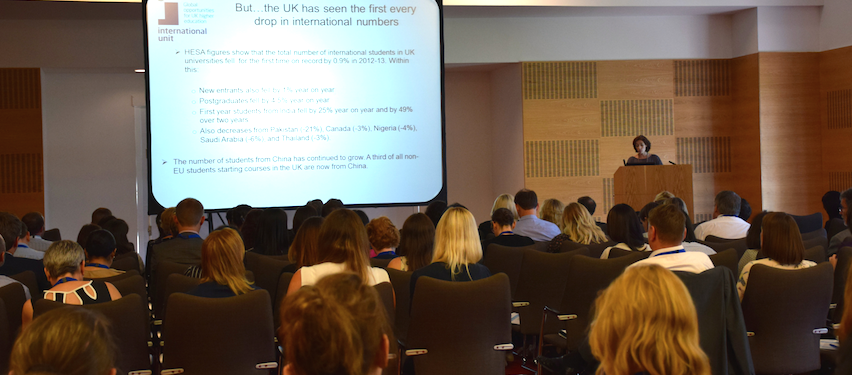The UK’s education exports have been labelled a “growth success story” by the government despite the first ever drop in overseas student numbers. Meanwhile, Vivienne Stern, Director of the UK HE International Unit, has counselled HE stakeholders that significant opportunity exists overseas even in countries without strong British links.
News and business analysis for Professionals in International Education
Have some pie!
UK HE not a “cash cow” but a “growth success story”
 Stern addressed the BUILA delegates
Stern addressed the BUILA delegates Stern addressed delegates at the British Universities International Liaison Association (BUILA) 10th Annual Conference in Edinburgh, Scotland last week alongside Brian Johnson, Head of International HE Strategy, at the Department of Business, Innovation & Skills (BIS).
Johnson upheld the government’s claim that education earnings are increasing despite a fall in student intake. He said international education is “not a money making machine; it’s a growth model, not necessarily a cash cow”.
International education is “not a money making machine; it’s a growth model, not necessarily a cash cow”
“I know there has been debate about the number of students decreasing and the international student intake over the last year, but actually the earnings are continuing to grow and it’s a growth success story,” he said. “Overall education exports bring about £18bn to the UK economy, the lion’s share of that is from international higher education.”
He went on to tell delegates that “unlike many other industries, international education really does aid the UK’s diplomatic aims.”
“Often education allows government to engage with overseas partners where there are not other avenues to engage, so it’s a real strength,” he said.
Meanwhile, Stern encouraged delegates that there is still a “strong appetite” for working with UK universities, even in countries where the UK is lacking established links.
She also took a strong stance against the government’s current net migration policy saying any government would be “foolish” to continue that approach. “It has damaged us,” she confirmed.
Other presentations at the event attended by 205 delegates from 95 UK universities covered how the sector is facing policy shake-ups in the lead up to 2015’s general election and the transition of UCAS, the university application system, to a digital format.
Programme Manager for Universities UK (UUK) Jo Attwool discussed UUK’s lobbying activity over the coming months in response to health levies and landlord checks introduced in the recently passed Immigration Bill.
The impending NHS Surcharge, that would see international students undertaking three year undergraduate courses pay £450 (£150 per year), was touched on.
The legislation is subject to further debate in the House of Commons and the House of Lords, and it is not known when this will be implemented, although the general consensus among delegates was that it will happen before the election.
UUK is also working to negotiate landlord checks requiring private landlords to check the immigration status of tenants before a contract can be signed.
Currently, the policy will be phased and piloted through different regions in the UK with residential letting associations and homeless charities forming a consultative panel led by Lord Best.
The news on where in the UK landlord checks will be phased initially is expected to be announced in the next few weeks, though it is likely to be a city with a high migrant population.
“Often education allows government to engage with overseas partners, where there are not other avenues to engage”
Fiona Johnstone, Head of International Strategy at UCAS explained the essential UKHE application platform is moving towards a digital delivery platform with a “one-to-many” training ethos as it works with the British Council on its agent training in order to improve how UCAS is explained to agents.
UCAS will also be undergoing huge structural change over the next 18 months, Johnstone added.
With 134 university members, BUILA supports the work and professional interests of staff working in international recruitment and liaison at UK higher educational institutions by lobbying with government bodies indcluding the Home Office and BIS.
Still looking? Find by category:



6 Responses to UK HE not a “cash cow” but a “growth success story”